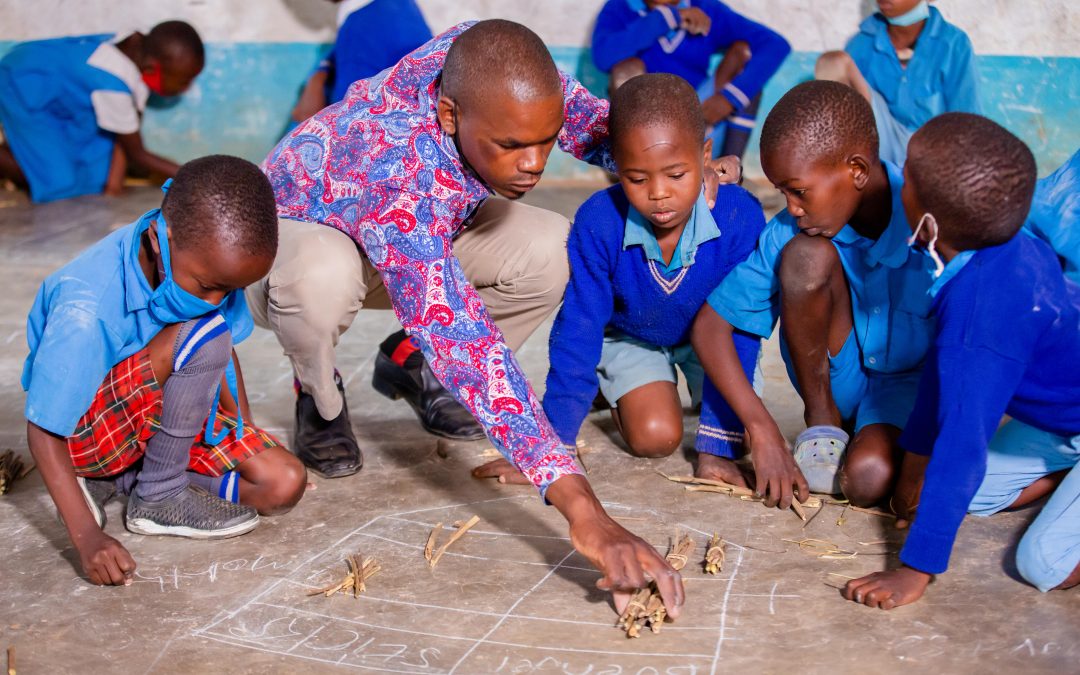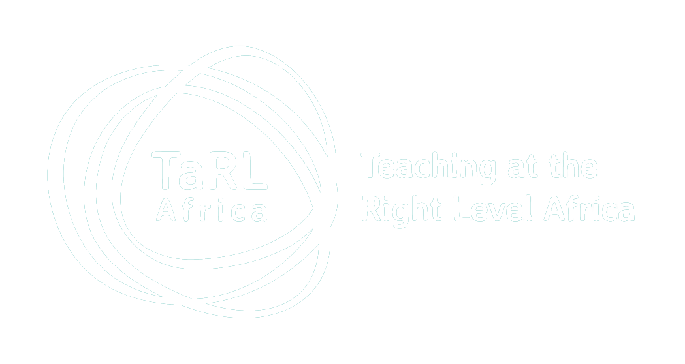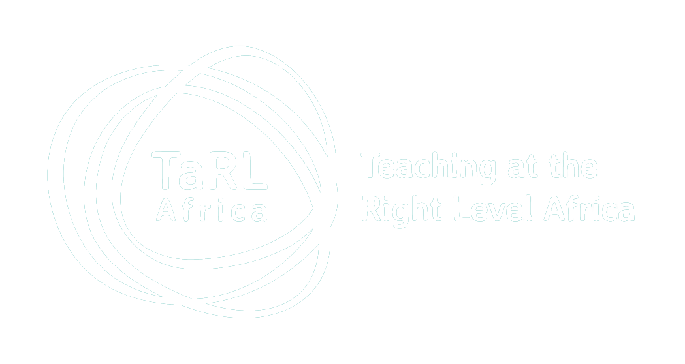
A teacher facilitating a TaRL numeracy activity. Photo: TaRL Africa
Foundational literacy skills such as reading, writing, and arithmetic are important. These skills help children learn and master concepts in school, which build them to become successful, productive individuals. As the world commemorates the fifth International Day of Education under the theme “to invest in people, prioritize education” many children worldwide struggle to gain foundational skills. For instance, in Sub-Saharan Africa, 70 percent of 10-year-olds are unable to understand a simple written text, according to The State of Global Learning Poverty: 2022 Update.
Accelerated learning programs such as Teaching at the Right Level (TaRL) interventions have been successfully piloted and adopted in several African countries to help children acquire foundational literacy skills. In TaRL programs, children are assessed using a simple assessment tool and then grouped according to their current learning level rather than by age or grade. Each group is taught using play level-appropriate activities and contextualized materials, starting from what the child already knows.
So how do TaRL programs leverage individuals, organizations and systems in the existing education landscape to support children gain foundational literacy and numeracy skills?
Creating leaders of practice and developing a culture of learning
In TaRL interventions, learning begins by doing. Therefore actors in TaRL programming receive technical knowledge about the approach through training and practical experience. In particular, TaRL interventions seek to develop a cadre of “Leaders of Practice” to train and support others to deliver TaRL. This includes Master Trainers (who deliver TaRL trainings), and Mentors (who provide onsite continuous support to teachers that facilitate the TaRL sessions).
These Leaders of Practice are trained and conduct their own TaRL sessions for 15 to 20 days. During this time, they gain hands-on experience in delivering TaRL in the classroom and experience the progress of children’s improved learning outcomes. TaRL Africa’s technical support and coaching to partners and implementers continues throughout TaRL implementation, with an active focus on cultivating a cadre of leaders of practice with the know-how and passion to continually adapt, improve and grow the program in their context.
It is also important to enable an ecosystem of support within TaRL programming. Meera Tendolkar, a Member of TaRL Africa’s Senior Management Team and the Director of Content and Training for Numeracy emphasizes the significance of having regular interactions across different actors involved in TaRL interventions, including government officials, members of the implementation team, master trainers and the TaRL facilitators themselves. “We need to listen to the challenges that teachers face and help them to find solutions,” said Meera.
However, instead of giving direct suggestions or instructions, systems and programs need to create spaces that let facilitators and implementers talk about their concerns. This promotes a culture of learning as different actors discuss opinions and find solutions organically. “Often, we need to just give the teachers some guidance,” she said.
A teachers’ comfort with the approach translates to confidence in conducting TaRL sessions. For example, Kokola Acka Hermann, a school principal in Côte d’Ivoire supports the implementation of the country’s TaRL intervention Programme d’Enseignement Ciblé (PEC) in her school. Hermann highlights how the program has improved learners’ foundational skills in French and maths through quality delivery, . “I have seen progress, especially in maths. Children who were at beginner level moved on to subtraction level at the end of the year, which was really impressive,” said Kokola.
Supporting governments and systems to cultivate sustainable interventions
Government officials are key stakeholders in education systems as they spearhead educational policies that in return ensure quality education for children. Building on the global momentum generated by the UN Transforming Education Summit in September 2022, this year’s education day calls for maintaining strong political mobilization around education and charting the way to translate commitments and global initiatives into action.
Efforts to strengthen and leverage systems at different levels of government have helped TaRL programs in several contexts. For instance, in Borno State in Nigeria, a Project Implementation Committee as well as monitoring committees have been constituted to support TaRL delivery. “Even at the Local Governance Area (LGA) levels, we have constituted an implementation committee with well defined structures to support TaRL implementation,” said Umar Mallam Lawan, the UNICEF State leader for TaRL in Borno.
Working with local NGO’s to scale up the TaRL approach in Africa
TaRL Africa is working with local organisations to scale up and strengthen the TaRL approach in different contexts across Sub-Saharan Africa. Additionally, TaRL Africa is also stengthening children’s foundational skills beyond school classrooms, with several partners delivering the TaRL in local communities. For instance, Grassroots Nest for Innovations and Change (GRiC) is an organization that works in pastoralist areas inhabited by the Maasai community in Kenya. Through rigorous capacity development of trainers, the organization has been using the Language Learning from Familiar to Formal (L2F2) methodology, which provides a roadmap that allows children to progressively learn the formal language of instruction using their local language. In Uganda, our partner YARID has adapted the approach to support refugee children to access mainstream schooling, training teachers and volunteers in the refugee settlements camps to deliver TaRL programming.
Education plays a key role in shaping successful people because it equips individuals with the different skills and knowledge needed to be productive and successful citizen. Through the power of education, children and ordinary citizens, will be able to contribute to their community and help make it a better place to live in.

